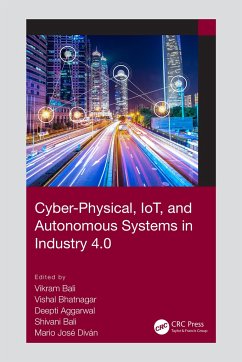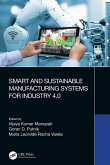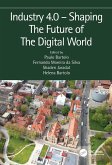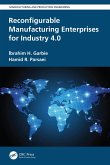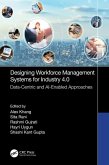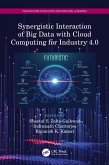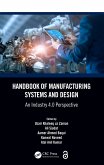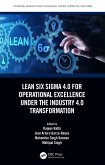Cyber-Physical, IoT, and Autonomous Systems in Industry 4.0
Herausgeber: Bali, Vikram; Aggarwal, Deepti; Bhatnagar, Vishal
Cyber-Physical, IoT, and Autonomous Systems in Industry 4.0
Herausgeber: Bali, Vikram; Aggarwal, Deepti; Bhatnagar, Vishal
- Gebundenes Buch
- Merkliste
- Auf die Merkliste
- Bewerten Bewerten
- Teilen
- Produkt teilen
- Produkterinnerung
- Produkterinnerung
This book addresses topics related to the Internet of Things (IoT), machine learning, cyber-physical systems, cloud computing, and autonomous vehicles in Industry 4.0. It investigates challenges across multiple sectors and industries and considers Industry 4.0 for operations research and supply chain management. Cyber-Physical, IoT, and Autonomous Systems in Industry 4.0 encourages readers to develop novel theories and enrich their knowledge to foster sustainability.¿It examines the recent research trends and the future of cyber-physical systems, IoT, and autonomous systems as they relate to…mehr
Andere Kunden interessierten sich auch für
![Smart and Sustainable Manufacturing Systems for Industry 4.0 Smart and Sustainable Manufacturing Systems for Industry 4.0]() Smart and Sustainable Manufacturing Systems for Industry 4.0206,99 €
Smart and Sustainable Manufacturing Systems for Industry 4.0206,99 €![Industry 4.0 - Shaping The Future of The Digital World Industry 4.0 - Shaping The Future of The Digital World]() Industry 4.0 - Shaping The Future of The Digital World220,99 €
Industry 4.0 - Shaping The Future of The Digital World220,99 €![Reconfigurable Manufacturing Enterprises for Industry 4.0 Reconfigurable Manufacturing Enterprises for Industry 4.0]() Ibrahim H. GarbieReconfigurable Manufacturing Enterprises for Industry 4.0195,99 €
Ibrahim H. GarbieReconfigurable Manufacturing Enterprises for Industry 4.0195,99 €![Designing Workforce Management Systems for Industry 4.0 Designing Workforce Management Systems for Industry 4.0]() Designing Workforce Management Systems for Industry 4.0175,99 €
Designing Workforce Management Systems for Industry 4.0175,99 €![Synergistic Interaction of Big Data with Cloud Computing for Industry 4.0 Synergistic Interaction of Big Data with Cloud Computing for Industry 4.0]() Synergistic Interaction of Big Data with Cloud Computing for Industry 4.0206,99 €
Synergistic Interaction of Big Data with Cloud Computing for Industry 4.0206,99 €![Handbook of Manufacturing Systems and Design Handbook of Manufacturing Systems and Design]() Handbook of Manufacturing Systems and Design217,99 €
Handbook of Manufacturing Systems and Design217,99 €![Lean Six SIGMA 4.0 for Operational Excellence Under the Industry 4.0 Transformation Lean Six SIGMA 4.0 for Operational Excellence Under the Industry 4.0 Transformation]() Lean Six SIGMA 4.0 for Operational Excellence Under the Industry 4.0 Transformation127,99 €
Lean Six SIGMA 4.0 for Operational Excellence Under the Industry 4.0 Transformation127,99 €-
-
-
This book addresses topics related to the Internet of Things (IoT), machine learning, cyber-physical systems, cloud computing, and autonomous vehicles in Industry 4.0. It investigates challenges across multiple sectors and industries and considers Industry 4.0 for operations research and supply chain management. Cyber-Physical, IoT, and Autonomous Systems in Industry 4.0 encourages readers to develop novel theories and enrich their knowledge to foster sustainability.¿It examines the recent research trends and the future of cyber-physical systems, IoT, and autonomous systems as they relate to Industry 4.0. This book is intended for undergraduates, postgraduates, academics, researchers, and industry individuals to explore new ideas, techniques, and tools related to Industry 4.0.
Hinweis: Dieser Artikel kann nur an eine deutsche Lieferadresse ausgeliefert werden.
Hinweis: Dieser Artikel kann nur an eine deutsche Lieferadresse ausgeliefert werden.
Produktdetails
- Produktdetails
- Verlag: CRC Press
- Seitenzahl: 420
- Erscheinungstermin: 24. Dezember 2021
- Englisch
- Abmessung: 240mm x 161mm x 27mm
- Gewicht: 793g
- ISBN-13: 9780367705152
- ISBN-10: 036770515X
- Artikelnr.: 62276606
- Herstellerkennzeichnung
- Libri GmbH
- Europaallee 1
- 36244 Bad Hersfeld
- gpsr@libri.de
- Verlag: CRC Press
- Seitenzahl: 420
- Erscheinungstermin: 24. Dezember 2021
- Englisch
- Abmessung: 240mm x 161mm x 27mm
- Gewicht: 793g
- ISBN-13: 9780367705152
- ISBN-10: 036770515X
- Artikelnr.: 62276606
- Herstellerkennzeichnung
- Libri GmbH
- Europaallee 1
- 36244 Bad Hersfeld
- gpsr@libri.de
Vikram Bali is Professor and Head-Computer Science and Engineering Department at JSS Academy of Technical Education, Noida, India. He had graduated from REC, Kurukshetra - B.Tech (CSE), Post Graduation from NITTTR, Chandigarh - M.E (CSE) and Doctorate (Ph.D) from Banasthali Vidyapith, Rajasthan. He has more than 20 years of rich academic and administrative experience. He has published more than 50 research papers in International Journals/Conferences and edited Books. He has authored Five text books. He has published 06 Patents. He is on editorial board and on the review panel of many International Journals. He is SERIES EDITOR for three Book Series of CRC Press- Taylor & Francis Group. He is a lifetime member of IEEE, ISTE, CSI and IE. He was Awarded Green Thinker Z-Distinguished Educator Award 2018 for remarkable contribution in the field of Computer Science and Engineering at 3rd International Convention on Interdisciplinary Research for Sustainable Development (IRSD) at Confederation of Indian Industry (CII), Chandigarh. He has attended Faculty Enablement program organised by Infosys and NASSCOM. He is member of board of studies of different Indian Universities and member of organizing committee for various National and International Seminars/Conferences. He is working on four sponsored research projects funded by TEQIP-3 and Unnat Bharat Abhiyaan. His research interest includes Software Engineering, Cyber Security, Automata Theory, CBSS and ERP. Vishal Bhatnagar holds B.E, MTech and PhD in the Engineering field. He has more than 21 years of teaching experience in various technical institutions. He is currently working as Professor in Computer Science & Engineering Department at Netaji Subhash University of Technology East Campus (Formerly Ambedkar Institute of Advanced Communication Technologies & Research), Delhi, India. His research interests include Data-Mining, Social Network Analysis, Data Science, Blockchain and Big Data Analytics. He has to his credit more than 130 research papers in various international/national journals, conferences and Book Chapters. He is currently working as Associate Editor of few Journals of IGI global and Inderscience. He has to his credit experience of handling special issues of Many Scopus, ESCI and SCIE Journals. He is SERIES EDITOR- for three Book Series of CRC Press- Taylor & Francis Group. He has also edited many books of Springer, Elsevier, IGI Global and CRC Press. He is life time member of Indian Society for Technical Education (ISTE). He has also worked as editor of many edited books of Springer, IGI global, CRC press to name a few. Deepti Aggarwal is an Assistant Professor in Department of Computer Science and Engineering at JSS Academy of Technical Education, Noida. She has more than 20 years of academic experience in teaching UG and PG computer science courses. She has received her B. Tech. (CSE) from Maharishi Dayanand University, Rohtak, M.Tech. (CSE) from Rajasthan Vidyapeeth, Udaipur and Ph.D. from Jaipur National University, Jaipur. She has published Patent on Smart Dustbin- Sanitation & Solid-Liquid Waste Management. She has written a book on 'Computer Organisation' in the year 2011. She has published several papers in international journals and conferences of repute. Her areas of interest include Machine Learning, Cyber Security, IOT and Data Mining. She has been reviewer, guest editor of several reputed Journals and Books. She has also served many conferences as Session Chair. Shivani Bali is an academician, trainer, researcher and consultant with more than 17 years of experience in the field of Decision Sciences and Operations Management. She is working as Professor at Jaipuria Institute of Management, Noida. She has published around 30 research papers indexed in SCI/WoS/ Scopus journals and published 04 patents. She has been working on consulting assignments with many reputed companies and have imparted training programs in the area of data science and business analytics. Her areas of interest are Business Analytics, Data Science, Operations and Supply Chain Analytics. Mario José Diván is a full professor and head of the Data Science Research Group at the National University of La Pampa, Argentina. His scientific interests lie in the area of Data Mining, Data Stream, Stream Mining, High-performance Computing, Big Data, IOT, Data Quality, Measurement, and Evaluation.
1. Cyber Systems And Security In Industry 4.0. 2. A Demand Response Program
For Social Welfare Maximization In The Context Of Indian Smart Grid. 3.
Cloud Computing Security Framework Based On Shared Responsibility Models.
4. Performance Analysis Of Hypervisor And Container-Based Migration
Technique For Cloud Virtualization. 5. Segmentation of Fine-Grained Iron
Ore Using Deep Learning and the Internet of Things Segmentation of
Fine-Grained Iron Ore. 6. Amalgamation Of Blockchain Technology And Cloud
Computing For A Secure And More Adaptable Cloud. 7. Cloud, Edge And Fog
Computing: Trends And Case Studies. 8. Progression In Cyber Security
Concerns For Learning Management System: Analyzing The Role Of
Participants. 9. A Security Model For Cloud Computing Based E-Governance
Applications. 10. Automatic Time And Motion Study Using Deep Learning. 11.
Integrating IOT for Industry. 12. Impact Of Deep Learning And Machine
Learning In Industry 4.0. 13. IOT Applications In Research Domains. 14.
Spatio-Temporal Model For Analysis And Classification Of Soil Using IOT.
15. Autonomous Vehicles. 16. A Meta-Learning Approach For Algorithm
Selection For Capacitated Vehicle Routing Problem. 17. Early Detection Of
Autism Disorder using Predictive Analysis. 18. Computing Technologies For
Prognosticating Emanation Of Carbon Using Arima Model. 19. DWT And SVT
Based Robust Watermarking Using Differential Evolution With Adaptive
Optimization. 20. A Novel Framework Based On Machine Learning Algorithm For
Estimation Of Covid-19 Cases. 21. Assessing Pollutant Concentrations Impact
On Coronavirus. 22. Simultaneous Mapping And Localization: A Comprehensive
Review Of Slam Techniques. 23. A Novel Evolutionary Computation Method For
Securing The Data In Wireless Networks.
For Social Welfare Maximization In The Context Of Indian Smart Grid. 3.
Cloud Computing Security Framework Based On Shared Responsibility Models.
4. Performance Analysis Of Hypervisor And Container-Based Migration
Technique For Cloud Virtualization. 5. Segmentation of Fine-Grained Iron
Ore Using Deep Learning and the Internet of Things Segmentation of
Fine-Grained Iron Ore. 6. Amalgamation Of Blockchain Technology And Cloud
Computing For A Secure And More Adaptable Cloud. 7. Cloud, Edge And Fog
Computing: Trends And Case Studies. 8. Progression In Cyber Security
Concerns For Learning Management System: Analyzing The Role Of
Participants. 9. A Security Model For Cloud Computing Based E-Governance
Applications. 10. Automatic Time And Motion Study Using Deep Learning. 11.
Integrating IOT for Industry. 12. Impact Of Deep Learning And Machine
Learning In Industry 4.0. 13. IOT Applications In Research Domains. 14.
Spatio-Temporal Model For Analysis And Classification Of Soil Using IOT.
15. Autonomous Vehicles. 16. A Meta-Learning Approach For Algorithm
Selection For Capacitated Vehicle Routing Problem. 17. Early Detection Of
Autism Disorder using Predictive Analysis. 18. Computing Technologies For
Prognosticating Emanation Of Carbon Using Arima Model. 19. DWT And SVT
Based Robust Watermarking Using Differential Evolution With Adaptive
Optimization. 20. A Novel Framework Based On Machine Learning Algorithm For
Estimation Of Covid-19 Cases. 21. Assessing Pollutant Concentrations Impact
On Coronavirus. 22. Simultaneous Mapping And Localization: A Comprehensive
Review Of Slam Techniques. 23. A Novel Evolutionary Computation Method For
Securing The Data In Wireless Networks.
1. Cyber Systems And Security In Industry 4.0. 2. A Demand Response Program
For Social Welfare Maximization In The Context Of Indian Smart Grid. 3.
Cloud Computing Security Framework Based On Shared Responsibility Models.
4. Performance Analysis Of Hypervisor And Container-Based Migration
Technique For Cloud Virtualization. 5. Segmentation of Fine-Grained Iron
Ore Using Deep Learning and the Internet of Things Segmentation of
Fine-Grained Iron Ore. 6. Amalgamation Of Blockchain Technology And Cloud
Computing For A Secure And More Adaptable Cloud. 7. Cloud, Edge And Fog
Computing: Trends And Case Studies. 8. Progression In Cyber Security
Concerns For Learning Management System: Analyzing The Role Of
Participants. 9. A Security Model For Cloud Computing Based E-Governance
Applications. 10. Automatic Time And Motion Study Using Deep Learning. 11.
Integrating IOT for Industry. 12. Impact Of Deep Learning And Machine
Learning In Industry 4.0. 13. IOT Applications In Research Domains. 14.
Spatio-Temporal Model For Analysis And Classification Of Soil Using IOT.
15. Autonomous Vehicles. 16. A Meta-Learning Approach For Algorithm
Selection For Capacitated Vehicle Routing Problem. 17. Early Detection Of
Autism Disorder using Predictive Analysis. 18. Computing Technologies For
Prognosticating Emanation Of Carbon Using Arima Model. 19. DWT And SVT
Based Robust Watermarking Using Differential Evolution With Adaptive
Optimization. 20. A Novel Framework Based On Machine Learning Algorithm For
Estimation Of Covid-19 Cases. 21. Assessing Pollutant Concentrations Impact
On Coronavirus. 22. Simultaneous Mapping And Localization: A Comprehensive
Review Of Slam Techniques. 23. A Novel Evolutionary Computation Method For
Securing The Data In Wireless Networks.
For Social Welfare Maximization In The Context Of Indian Smart Grid. 3.
Cloud Computing Security Framework Based On Shared Responsibility Models.
4. Performance Analysis Of Hypervisor And Container-Based Migration
Technique For Cloud Virtualization. 5. Segmentation of Fine-Grained Iron
Ore Using Deep Learning and the Internet of Things Segmentation of
Fine-Grained Iron Ore. 6. Amalgamation Of Blockchain Technology And Cloud
Computing For A Secure And More Adaptable Cloud. 7. Cloud, Edge And Fog
Computing: Trends And Case Studies. 8. Progression In Cyber Security
Concerns For Learning Management System: Analyzing The Role Of
Participants. 9. A Security Model For Cloud Computing Based E-Governance
Applications. 10. Automatic Time And Motion Study Using Deep Learning. 11.
Integrating IOT for Industry. 12. Impact Of Deep Learning And Machine
Learning In Industry 4.0. 13. IOT Applications In Research Domains. 14.
Spatio-Temporal Model For Analysis And Classification Of Soil Using IOT.
15. Autonomous Vehicles. 16. A Meta-Learning Approach For Algorithm
Selection For Capacitated Vehicle Routing Problem. 17. Early Detection Of
Autism Disorder using Predictive Analysis. 18. Computing Technologies For
Prognosticating Emanation Of Carbon Using Arima Model. 19. DWT And SVT
Based Robust Watermarking Using Differential Evolution With Adaptive
Optimization. 20. A Novel Framework Based On Machine Learning Algorithm For
Estimation Of Covid-19 Cases. 21. Assessing Pollutant Concentrations Impact
On Coronavirus. 22. Simultaneous Mapping And Localization: A Comprehensive
Review Of Slam Techniques. 23. A Novel Evolutionary Computation Method For
Securing The Data In Wireless Networks.

